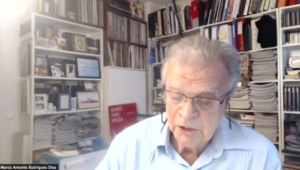Past, present and future of higher education in the world

Blog | By Marco Antonio Rodrigues Dias [1]

Participating in a meeting that celebrates the 30th anniversary of the journal “Higher Education and Society” (Educación Superior y Sociedad) [2] is a privilege. It represents for me a return to a past full of hope.
As director of the Division of Higher Education of UNESCO in Paris, from October 1981 to February 1999, I followed, from the beginning, as a sort of supervisor, the activities of the former Regional Center for Higher Education in Latin America and the Caribbean (CRESALC in Spanish), working in close cooperation with the Center’s directors, Enrique Oteiza, João Carlos Tedesco, Gustavo Lopez and Luís Yarzabal. I supported and encouraged the former CRESALC to take the courageous initiative of launching a journal that focused on the links between higher education and society.
In the mid-1980s at UNESCO headquarters in Paris, we included in the Organization’s program the creation of an international journal dedicated to higher education. The justification for this publication was simple: at that time, journals that dealt with the topic were almost exclusively from a European or North American perspective. There was space for an international publication within an organization such as UNESCO[3]
My first two assignments in UNESCO as director of the Division of Higher Education were to participate in the meetings of the consultative committees of the European Center for Higher Education (CEPES) in Bucharest and of the CRESALC in Venezuela (9th Meeting of the CRESALC Consultative Committee from November 11 to 13, 1981). I had the honor, in the latter case, to accompany Miguel Soler Roca, at the time Assistant Director-General for Education at UNESCO. Soler Roca had supervised the Center’s creation process and participated in the nomination of its first director, the Argentine Enrique Oteiza.
A Necessary Tribute
Miguel Soler Roca left us on May 19, 2021 when he was 99 years old. I want to pay tribute to one of the best UNESCO officials of all times. I had the privilege of being welcomed by him when I arrived in Paris. He introduced me to the then secretary of the division, Madeleine Schickler, and from the beginning, especially on the mission we undertook together in Caracas, he explained to me, simply but with extraordinary clarity, what could be expected of an organization like UNESCO and, consequently, how an official of this organization should behave.
In summary, I would say that Miguel Soler Roca, whom not everyone in the current generation had the privilege of knowing, saw in education not only an instrument for improving the individual, but, above all, a lever for building a better world. If, today, he were among us, he would certainly defend the concept of public good applied to education, that is, the principle according to which higher education must be accessible to all, without discrimination of any kind, contribute to the training of technically qualified and socially responsible citizens, be permanent and capable of adapting to society’s needs, which are in permanent mutation.
One of the first documents that Miguel made available to me stated that “the UNESCO higher education program should take into account that the changes in the hopes placed on higher education meant that training and research must respond to the new needs, in relation to the different levels of society; must contribute to the revitalization of economies, through the training of qualified professionals and the continuous or permanent training of workers, within a framework of rapidly changing technologies; must stimulate an adequate level of technological innovation, through research and the progress of scientific knowledge; and, finally, must maintain the orientation of pursuing social equality both nationally and internationally, at a time when economic difficulties were affecting, above all, the most disadvantaged groups.” Uniting knowledge and action then became the essential message of the pedagogical and social purposes of higher education training.
Needless to say, although my relationship with Soler Roca was short – he retired from UNESCO in 1982 – I immediately identified with him, even though I still didn’t know – what would happen soon after – elements of his personal history, the role he played in Uruguay in the development of rural education, in the creation of educational institutions for disadvantaged groups and, above all, in his struggle against the dictatorship in favor of a real democracy that would benefit everyone. A message that remains valid in the second decade of the 21st century.
For me it was an important starting point. Many of those who knew me during the years I worked at UNESCO do not know that, as a young man, I had the privilege, in 1963, of being part of a team at the Ministry of Education of Brazil, of which Paulo Freire, at the time with about 40 years old, was the main figure. He launched a new method of literacy that aimed not only to make citizens literate, but to help them become aware of the reality in which they lived and able to reflect and fight for changes to transform society, making it fairer.
Recently, in one of the interesting webinars organized by Kairós and other organizations, Professor Paulo Speller was kind enough to declare that my work had a great influence on the humanist orientation that he adopted in his actions in the field of higher education. Professor Ana Lúcia Gazzola went even further, saying that her gurus had been Jorge Brovetto – a deserved tribute – and myself. I even thought of calling these illustrious professors to thank them, but advising them not to repeat the feat, as they would be leveling out too low… I didn’t, and I’ll explain why. I am sure that both Paulo Speller and Ana Lúcia Gazola identified, in some of my texts, but especially in the work of the team I coordinated as director of the Division of Higher Education at UNESCO, elements of Paulo Freire’s thought.
Paulo Freire’s presence
And I’m going to tell you a secret: if you observe what was discussed in the area of higher education in the early nineties, when the publication of the journal “Higher Education and Society” began, and, going further -read carefully the document of UNESCO of 1995 (“Policy Paper on Change and Development in Higher Education”), “The World Declaration on Higher Education for the Twenty-first Century – Vision and Action” (WCHE of 1998)[4]. 2009 had no declaration, only a final communiqué, which represents a minor commitment of the signatories), it is possible to find principles from the line of thought of Paulo Freire. It is not surprising, therefore, that this document remains an international reference (see the summary of the declaration at the end of this text).
Let me get your attention to a few points highlighted in the 1998 declaration, at the origin of all the subsequent discussion that, in the region, culminated in the third CRES held in Cordoba, in 2018[5]:
- Higher education should be considered a public good.
- Today the main mission of higher education is to educate highly qualified graduates and responsible citizens and to provide a permanent and open space for high level learning. Higher education institutions must develop their critical and forward looking functions through truth and justice. For this, academic freedoms and autonomy are needed.
- Students must be at the center of the concerns of national and institutional decision makers. They are the essential protagonists for the renewal process of higher education.
- Relevance, participation in the search for solutions to society’s major problems, integration into a world of work in which the needs of societies are considered a priority, and development of the entire educational system are essential in the action of higher education systems and institutions. However, they must always base their long-term orientations on societal aims and needs, including the respect for cultures and the environment protection.
What was being debated in 1990
Of course, I do not intend, in a few minutes, to review the history of higher education, to discuss current problems and, acting as a suburban prophet, to say what higher education will look like in the future. Let’s be clear. I was given a mission to speak about the “present, past and future of higher education in the world.” I warned the event organizers that I would not have the intention of covering this topic in so small space of time. As we are celebrating the thirty years of the journal “Higher Education and Society”, I took a look at some documents and some personal notes from that time and the conclusion I came to is that one really shouldn’t try to reinvent the wheel. Most of the issues under discussion today were already debated at the time of the journal’s launch.
In 1989, the UNESCO General Conference and the International Conference on Education in Geneva analyzed the situation of higher education and asked UNESCO to draw up an action plan for higher education. These discussions and decisions led to the creation of the UNITWIN/UNESCO Chairs program in 1991, the policy paper on higher education of 1995 and the first WCHE of 1998. At that time, it was rare that, at a meeting of the UNESCO Executive Board, its members did not discuss one or more documents related to higher education. It was at this time that university networks were strengthened and, in the region, associations such as the Association of Amazonian Universities (UNAMAZ) and the Association of Universities of the Montevideo Group (AUGM) were created. Very diverse meetings, such as those held in Caracas (International seminar on international reflections on the new functions of higher education: the case of Latin America), Dakar (Senegal), Bristol (United Kingdom), Armidale (Australia), showed that an awareness was rapidly developing that relevance and quality are fundamental to higher education and that one could not exist without the other.
Africa and Asia
The debates that took place in Latin America and the Caribbean were mirrored in the numbers of the journal “Higher Education and Society.” It is interesting to note that, in Africa, the deficiencies of higher education were centered on: the irrelevance of training obtained abroad for local realities; the artificial division of various disciplines and educational levels; the imbalance between the sciences and the humanities; and the orientation of some research themes, more useful for publication than for solving concrete problems, mechanically adapting European systems to completely different cultural realities.
It is also worth recalling the case of Asia and the Pacific. In October 1990, in Armidale, Australia, at a regional meeting on the perspectives and main trends on higher education in the region, the importance of academic mobility, innovation studies, and the expansion of the employment of graduates in higher education was highlighted. It was clear from the analyzes presented that countries that had invested heavily in higher education, such as Korea, Malaysia and even Thailand, had significant growth rates and were able to stimulate social mobility.
It was noted that all countries in the region were looking for ways to increase cooperation with the productive sector: private or public. However, and this point remains more than current, in countries like Thailand, Indonesia and Japan, the privatization of public educational institutions, including universities, did not bring any results in improving the quality of education. We will come back to this question later.
Hic et nunc and the past
In the seventies, many psychologists, in a hidden or even direct criticism of Freud, said that it was not worth it to go into the past. The essential is the “here and now” the “hic et nunc” of the scholastic philosophers. It is evident that all reflection must aim at knowledge of the current reality, in order, through its analysis, to reach decisions on actions that can improve systems, making them increasingly useful for creating a better society. There is no justification for thinking and acting as if we were still in the past.
However, knowledge of the past is useful, if only for avoiding mistakes. Currently, with the pandemic, universities around the world have been forced to find new ways of functioning, and it is worth remembering that universities in Latin America and the Caribbean, such as the University of the Republic (UDELAR) in Montevideo, and the University of Brasilia (UnB) and the Federal University of Minas Gerais (UFMG) in Brazil, the University of Cordoba, in Argentina, and many others, were able to adapt and collaborate in the search for solutions to face the epidemic.
But, the adaptations were not made without problems arising. Even in a country like France, during the period of strict lockdown, a significant number of students – more than a half – had difficulties in following distance learning. The lack of instruments and equipment aggravated the structural difficulties linked to gender, social class, sex and race. There are teachers who have not been able to adapt to the new methods.
In different regions of the world, it was observed that many professors despaired of opportunistic institutions, which increased the number of students to obtain more income, starting to hold meetings of all kinds, asking for detailed reports on all activities; the 24 hour day has become for some too short for everything that needed to be done. So I wonder how difficult it is to be a teacher right now.
As I have already pointed out, even in more favored sectors, students suffer the lack of common social interaction in the university environment. With closed libraries and laboratories, there are also university canteens that have ceased to function, as a result of which many students were deprived of the minimum subsistence conditions, and, moreover, many ended up quitting university. The precariousness of students in some places has increased because unemployment has risen, including with regard to non-permanent activities, in which, in normal times, students often found their source of livelihood.
Positions and analysis on the effect of the pandemic on higher education are multiplying throughout the world and are often highlighted by exaggerations. Many seem to believe that universities are only now discovering the potential of new technologies. It’s not like that. The trend was already present and, in countries like England, in the big universities, a good part of the teaching was remotely. The same happened in several countries in all over the world. The 1998 WHEC declaration already pointed out that higher education must benefit as much as possible from new technologies, in particular from new information technologies, to which access must be as wide as possible throughout the world. In other words, new technologies must serve everyone, be an instrument to improve access, facilitate the democratization of training, and not only serve to consolidate the commercialization of education, transforming it definitively into a business.
Third WCHE
UNESCO intends to hold the third World Conference on Higher Education in May 2022, which, initially scheduled for October 2021, was postponed to 2022. The prudence and common sense shown by the Organization’s leaders in not organizing it in the middle of the pandemic must be recognized, giving time to a representative number of the world academic community to participate in its preparation.
WCHE are important. They serve to systematize a series of principles that support and justify concrete actions.
Let’s hope that the third WCHE consolidates the idea of higher education as a public good and democratic, therefore accessible to everyone; ensuring academic autonomy and freedom; encouraging institutions to transform themselves into centers of critical thinking and, as a result, into instruments in favor of democracy and opposition to dictatorships; that see students as adults and seek to strengthen the bonds of higher education with society.
The final document of a WCHE can become a reference and justify actions, as happened with the 1998 declaration. An event of this nature can consolidate the ideas of thinkers such as Paulo Freire, Miguel Soler Roca and others who advocate education as a public good and as an instrument for the improvement of society, training technically competent and conscientious citizens with critical capacity and potential to participate in the search for solutions to the problems of the societies in which they live.
But let us not forget the education marketers who seek, in every way, to reduce costs through standardized material, often copied or purchased abroad, with programs designed for cultural realities different from those of the students they are destined for. Nor can one forget the statement made by the director of one of the largest MOOC in the United States – made even before the pandemic – according to which, in a few years, in the entire world, there will be only about ten universities.
Representatives from Latin America played important roles in the 1998 and 2009 WHEC. The accumulated knowledge, reflected in particular in the journal “Higher Education and Society” and in the deep and extensive reflections elaborated during the third CRES held in Cordoba, in 2018, and supplemented, now, with debates promoted by various organizations such as IAU at the international level, and UDUAL, CSUCA, AUGM and others at the regional level, whether within UNESCO or IESALC, especially through Enlaces, and independent groups such as Kairós, should be presented in Barcelona on the occasion of the third WHEC.
The history of the 1998 World Conference on Higher Education, in its entirety, has yet to be told. The 2009 maneuver to destroy the basic concepts adopted in 1998, and which, after all, were ratified in 2009, is better known. With respect to the third World Conference on Higher Education to be hold in Barcelona in 2022, even those who are not prophets, can imagine that everything will be done by some so that, this time, the basic and essential principles adopted in 1998 and which correspond to the founding principles of UNESCO are destroyed for good, as reflected in its Charter and the Universal Declaration of Human Rights. Videos are already circulating in which it is said that the world has changed and, consequently, public universities must be privatized to improve the system’s efficiency. All lies.
Finally, I return to the initial document that Miguel Soler Roca put in my hands when I arrived at UNESCO in 1981. The analysis of the action of many multinationals in education revealed, even at that time, the range of means adopted to use science and technology with the objective of guaranteeing the control of the commercialization of products and the transfer of techniques. Developing countries remain structurally dependent on the scientific knowledge controlled by transnational corporations, even when they offer technology transfer. They are unable to create. They are condemned to imitate and copy.
I repeat once more: I am not a prophet, but during the next WCHE, many big bad wolves may try to present themselves dressed in a red hood, proposing, through beautiful speeches, a cooperation that, in reality, aims to maintain the old colonial system from the control of the few over the many. In a meeting like this, there is a lot of show and fantasy, and the risk of manipulation is very high. The key is to be attentive to the principles, to ensure that, in the final document, the values that guided the creation of UNESCO, the principles defended by educators such as Paulo Freire and, at UNESCO, by personalities such as Miguel Soler Roca, prevail, and that higher education, under current conditions, although different from those of the recent past, continues to be considered as a public good, accessible to all, and aimed at training conscientious citizens with a critical capacity to participate in the construction of a better and fairer society.
Post-pandemic Higher Education will be whatever Society is. And this will be what current generations desire. I hope you build an inclusive world where everyone benefits from development, a democratic world where access to cultural and material goods is for everyone, a world where human rights are respected, where nature and environment are protected, in which poverty is eliminated, as well as all discrimination based on sex, language, resources, race. At a time when three decades of the existence of the journal “Higher Education and Society” are being commemorated, it is important to remember the basic principles of initiatives like this one [6].
Elements of the 1998 WCHE Declaration
- Higher education shall be equally accessible to all, depending on each merit. No discrimination can be admitted. Women’s participation must be strengthened.
- The main mission of higher education today is training citizens, offering them a permanent space for high-quality learning and for learning through life.
- Higher education institutions must develop their critical spirit through truth and justice, submitting all their activities to the requirement of ethical and scientific rigor. For this, academic freedoms and autonomy are needed.
- Quality in higher education is a multidimensional concept that must encompass all its functions and activities. Special care will be taken to promote knowledge through research.
- Students must be at the center of the concerns of national and institutional decision-makers. They are the essential protagonists for the renewal process of higher education.
- From the perspective of lifelong learning, it is essential to diversify systems, institutions and study programs. A vigorous staff improvement policy is imperative.
- Higher education must benefit as much as possible from new technologies, in particular from new information technologies, to which access must be as wide as possible throughout the world.
- Higher education must be considered a public good.
- The international dimension of higher education is part of its quality, and the establishment of networks whose action is based on solidarity and equality among its members must be encouraged and become an essential instrument for institutions and systems.
- Relevance must be measured by the adequacy between what higher education institutions do and what society expects of them. Relevance, participation in the search for a solution to society’s major problems, integration into a world of work in which the needs of societies are considered a priority, and development of the entire educational system are essential in the action of higher education systems and institutions. These must always base their long-term orientations on the objectives and needs of society, including respect for cultures and protection of the environment.
[1] Former director of the Division of Higher Education of UNESCO in Paris (1981-1999) mrodriguesdias@gmail.com
[2] The journal “Higher Education and Society” followed up on an earlier bulletin in Caracas, which also contained feature articles, but whose objectives were more modest.
[3] I won’t go into details, but we soon realized that doing this at UNESCO in Paris was not feasible. The CRESALC initiative, while Gustavo Lopez Ospina was director and the competent and motivated Carmen Garcia Guadilla responsible for the publication, could only arouse interest and support.
[4] The 2009 Conference had no declaration, only a final communiqué, which represents a minor commitment of the signatories), it is possible to find principles from the line of thought of Paulo Freire. It is not surprising, therefore, that this document remains an international reference (see the summary of the declaration at the end of this text).
[5] The first Regional Conference on Higher Education (CRES) took place in Havana, Cuba, in 1996; the second in Cartagena de Indias, Colombia, in 2008 and the third in Cordoba, Argentina, in 2018, coinciding with the centenary of the Declaration and Reform of Cordoba.
[6] Due to the impact and family trauma that befell my family recently (November 2020), with the death of my wife, I have not participated in many of the debates related to higher education today. When she had an unexpected crisis, none of us could have predicted the gravity of the situation. The origin of everything was an ancient lung cancer, caused – there is no doubt – by excessive smoking at one time in her life. She stopped smoking in 2009, but the damage was already done. I cannot fail to express my anger at the tobacco industry and advertising, which has turned into organized crime, tolerated around the world.
Main photo by Charl Folscher on Unsplash
Secondary photo: Marco Antonio Rodrigues Dias, former director of higher education at UNESCO.
RELATED ITEMS








